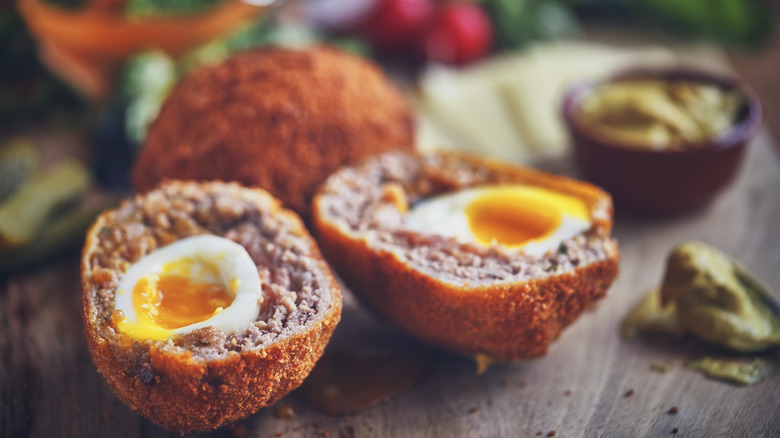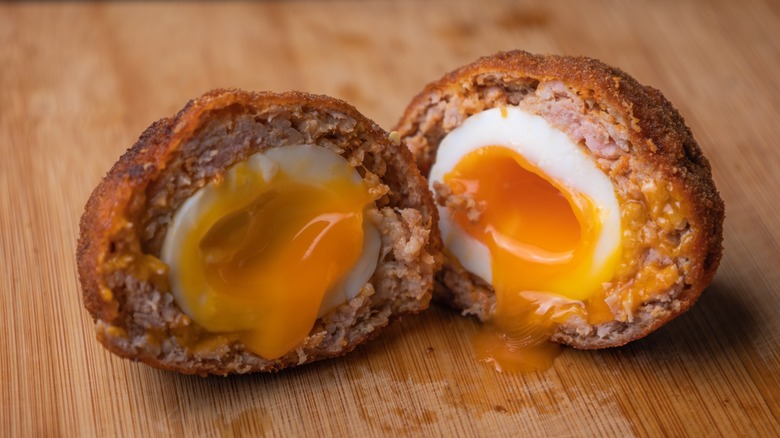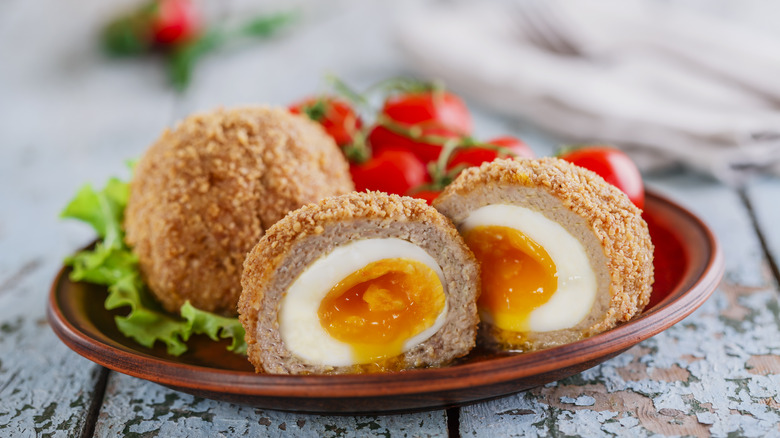The Mysterious Origins Of The Name 'Scotch Egg'
If you've never eaten one, the description of a Scotch egg sounds like something out of a fever dream. A Scotch egg is a hard-boiled (or, if you're dealing with the pros, medium-boiled) egg wrapped in sausage, covered in bread crumbs, and deep fried. You're likely to see them pop up at Renaissance Faires and in English pubs. Scotch eggs could pop up basically anywhere someone has decided to throw dietary caution to the wind. All in all, they're certainly one of the world's wackier egg preparations.
And it goes without saying that the dish's name comes from its Scottish origins, right? Well ... not so much, it turns out. The origins of the Scotch egg are both disputed and shrouded in some layers of mystery, and there are a whole bunch of possible origin stories. One thing seems absolutely certain, though: Scotch eggs didn't come from anywhere in Scotland.
The origin stories might give some clues as to why they're called Scotch eggs
The most commonly-held origin story of the Scotch egg is that they were originally conceived at Fortnum & Mason, a high-end London department store dating from 1707. Fortnum & Mason has a centuries-long reputation for creating and supplying luxury foodstuffs, and it passionately claims to be the creator of the Scotch egg in 1738. The company's website claims that it got the name "scotched" due to the addition of anchovies in the meat to strengthen the flavor.
Food historians aren't so sure, though. There's a competing claim to the invention of the Scotch egg from a town called Whitby in Yorkshire. Supposedly, they were sold by a food purveyor called William J. Scott & Sons. If this explanation is true, that's a mystery solved; the name "Scotch" simply comes from the fact the guy who originally sold them had the last name "Scott."
But what if it isn't? What else could've caused the name "Scotch?"
There was a process called scotching, but we don't know what it was
One theory is that Scotch eggs were originally cooked over an open flame and called "scorch" eggs, which linguistic drift eventually turned into "Scotch." The other concept is the idea of "scotching," a process mentioned in the historical culinary record but lost to time as to the specifics. Fortnum & Mason claims that means adding anchovies to the meat, but it could just as likely reference the early inclusion of mincemeat (leftover meat mixed with offal) instead of pure sausage.
It could even be a reference to the Scottish egg trade of the 19th century, whereby eggs were sometimes dipped in lime for preservation — a process which might've been known as "scotching." The last possible explanation is the only one that even references Scotland itself, although even that one doesn't imply the dish is from the country.
The truth is, any of these explanations are plausible — or none of them. We'll likely never know the true origins of why Scotch eggs are called that, but thankfully, we don't need to in order to enjoy them.


